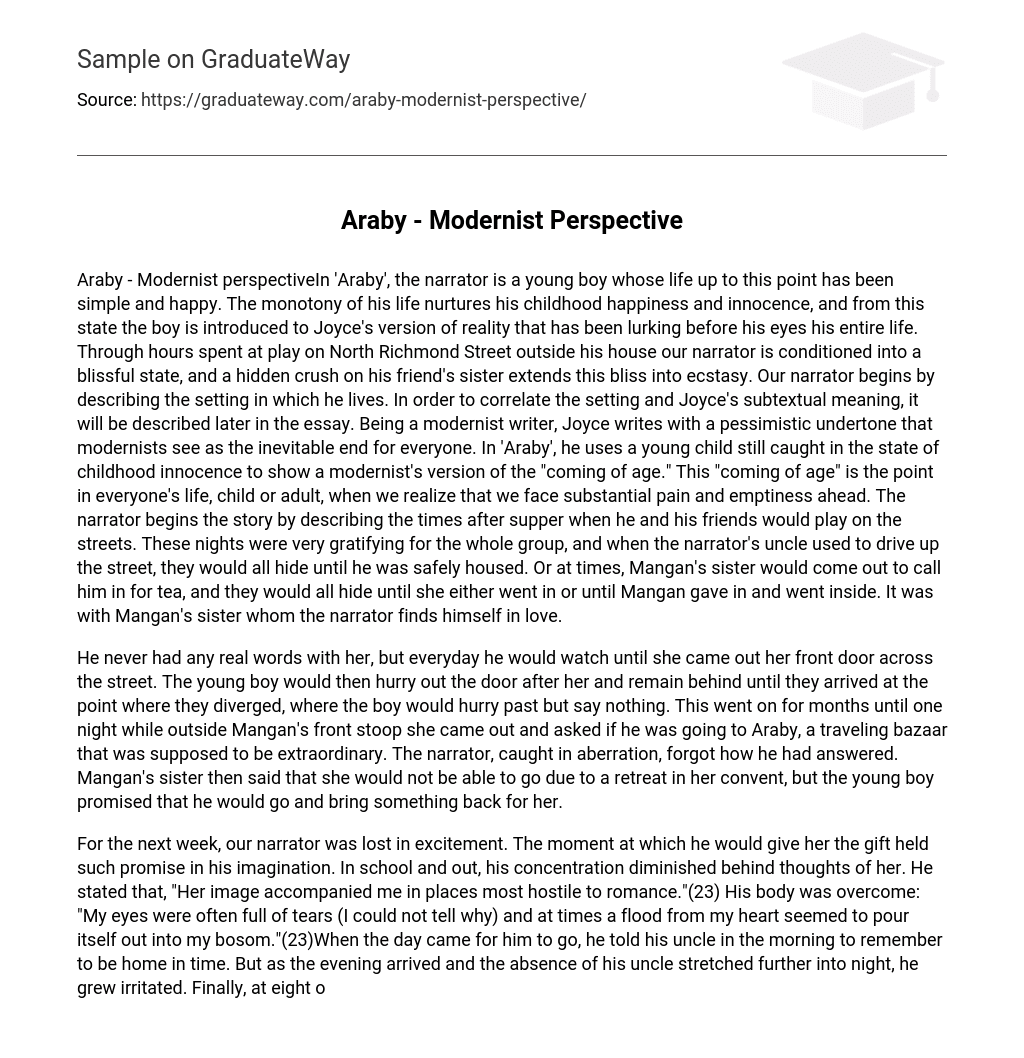In ‘Araby’, the narrator is a young boy whose simple and happy life has nurtured his childhood happiness and innocence. Through hours spent playing on North Richmond Street, the narrator is conditioned into a blissful state, and his hidden crush on his friend’s sister intensifies this bliss. The setting in which he lives will be described later in the essay to correlate with Joyce’s subtextual meaning. As a modernist writer, Joyce portrays a pessimistic undertone that sees as the inevitable end for everyone. In ‘Araby’, Joyce uses a young child still caught in childhood innocence to illustrate a modernist’s interpretation of the “coming of age”, when we all realize that substantial pain and emptiness lies ahead. The story begins with the narrator describing the enjoyable times after supper when he and his friends would play on the streets, hiding from the narrator’s uncle when he drove up the street until he was safely indoors.Sometimes, Mangan’s sister would appear and ask him to come home for tea, causing them to hide until she left or until Mangan caved in and went inside. The narrator finds himself falling in love with Mangan’s sister.
Every day, the young boy eagerly awaited her emergence from her house across the street. He would trail behind her until they reached a point where their paths diverged. In silence, he would then hasten past her. This routine persisted for several months until one evening, while standing near Mangan’s front steps, she inquired if he planned to visit Araby, a renowned traveling bazaar known for its exceptional qualities. Caught off guard, the narrator couldn’t recall his response. Mangan’s sister informed him that she could not attend due to a retreat at her convent. Nevertheless, the young boy pledged to go on her behalf and bring back something as a token of his affection.
Throughout the following week, our narrator eagerly anticipated giving his gift to his love interest. Thoughts of her dominated his focus whether he was at school or out and about. He admitted, “Even in places where romance seemed unlikely, her image accompanied me” (23). Overwhelmed with emotion, tears filled his eyes for no reason and a flood of feelings poured out into his chest (23).
On the day he was supposed to leave, he reminded his uncle in the morning so he wouldn’t be late returning home. However, as evening fell and the uncle’s absence continued into the night, irritation grew within him. Finally, at eight o’clock, the uncle arrived and confessed to forgetting.
The boy took the money from him and made his way towards the train station. He reached the temporary bazaar stop that had been set up.
Upon entering the bazaar, the boy observed that majority of the shops were closed. Nevertheless, he did come across a few open ones, including a booth specializing in porcelain vases. While conversing with two men, the woman managing the booth noticed the boy gazing at the vases and approached him. She inquired if he was interested in making a purchase, but he politely declined. Subsequently, she resumed her conversation while periodically casting glances in his direction.
He departed and walked onto the main pathway. Towards the end, he heard a voice call out that the light was extinguished and peered into the darkness that engulfed the upper portion of the bazaar he was headed towards. The boy concludes the tale by saying, “As I looked up into the darkness, I saw myself as a creature driven and mocked by conceit; and my eyes burned with anguish and anger.” (27) Throughout the story, the narrator finds himself in a hopeless state at the end, which he had disregarded for the entire week. In fact, he sees his vanity in all the excitement he felt leading up to this day, when his hopes were crushed by reality. Joyce employs irony to depict the internalization of reality versus the illusion created by desire. Initially, the narrator describes the neighborhood where he resides. The houses on either side of the street faced each other with “brown composed faces.” (21) At the end of the street stood an occupied, two-story house. Joyce establishes the setting perfectly to parallel his underlying meaning. The houses facing each other have warm exteriors that are “aware of respectable lives within them.” (21) The “brown composed faces” and awareness of these exteriors symbolize the ignorance that the young boy had confronted until this point in his life. Utilizing the cliché “ignorance is bliss” reinforces modernist writers’ belief that the more we become aware of our surroundings and ourselves, the more pessimistic and ‘realistic’ we become.At the “blind end” (21), there stands a two-story house that is inhabited. Modernists also highlight the emptiness present in reality. By using the empty house at the end of the narrator’s street and the dark pathway he confronts at the story’s conclusion, Joyce reveals this emptiness to the reader. Modernists connect pain and emptiness as elements of reality. The young boy fails to obtain the gift that holds great significance to his love due to external forces beyond his control. This is where his pain lies. These same forces are also unveiled through his vanity, which modernists take pleasure in tormenting their readers with as the factor determining their fates. Ultimately, both the young boy and the reader arrive at the same realization: life inevitably entails suffering. This suffering results in a retreat from others as a means of escaping pain, ultimately leaving us feeling empty and solitary. The modernist solution to this predicament involves finding pleasure, intellectual stimulation, and sanity through art. Ironically, though, artists have a higher likelihood of mental instability compared to other professions. Therefore, Joyce successfully portrays society in a flawless manner according to many; however, his choice of literary genre creates a paradoxical situation for finding a resolution that ultimately leaves the reader searching once again.





